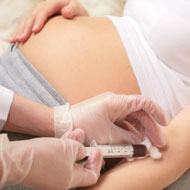- General Articles
- General Pregnancy Questions
- Baby Growth
- Pregnancy Diet
- Miscarriage
- During Pregnancy
- Twin Pregnancy
- Toddler Meals
- Home Remedies During Pregnancy
- Breastfeeding
- Pregnancy Week By Week
- Pregnancy Tests
- Ectopic Pregnancy
- Pregnancy Signs and Symptoms
- Pregnancy Stages
- Potty Training
- Fetal Development
- Preschooler
- Postpartum Depression
- Toddler Illness
- Baby Care
- After Pregnancy
- Molar Pregnancy
- During Delivery
- Beauty and Style
- Pregnancy Clothing
- Preconception
- Fertility
Bleeding Gums During Pregnancy
Bleeding gums during pregnancy is a common problem faced by many women during their pregnancy. The condition is known as pregnancy gingivitis and affects almost half of all mothers-to-be. The inflammation that occurs in the gums makes them appear reddish and tender to the touch, often triggering bleeding at the time of brushing or flossing. The incidence of gingivitis is much higher in pregnant women because hormonal changes during pregnancy make the gums more sensitive to bacteria in the plaque. Bad oral hygiene is another major contributing factor.
Gingivitis may also cause nodules to develop on the gums, which bleed while brushing or flossing. These are known as pregnancy tumors or pyogenic granuloma and while the names are scary enough, the nodules themselves are usually harmless and painless. They can grow up to a size of three fourths of an inch and can interfere with chewing and brushing.
In such cases they may need to be removed during pregnancy. It is important to pay heed to gingivitis and treat it promptly as it can lead to diseases such as periodontics and tooth loss. It may also result in pregnant women experiencing complication in their pregnancies, something better avoided.
How Bleeding Gums Affect Pregnancy
On the surface of it saying that bleeding gums can affect pregnancy seems quite ridiculous. Even though inconclusive, evidence is mounting that shows a link between severe gum disease and premature birth and low birth weight. There is evidence too to suggest that gum disease may play a role in the development of preeclampsia. This is a serious condition where the mother's blood pressure shoots up and can endanger both her life and the unborn child's life. Whether or not gingivitis during pregnancy can cause any of these conditions, it is important for the pregnant woman to take good care of her teeth.
Treating Bleeding Gums
'Prevention is better than a cure' is a mantra amongst doctors that holds true in this case. Even if the gingivitis doesn't result in pregnancy complications, no mother should take the risk of gingivitis developing into periodontitis.
To lessen the risks of developing gingivitis during pregnancy, it is essential to brush thoroughly and gently at least twice a day but preferably once after each meal. Flossing after meals is also essential to get rid of food particles that may be stuck in the teeth. Regular preventive care will also go a long way in preventing the onset of gingivitis. These visits to the dentist will ensure that plaque and tartar that has not been removed through brushing will also be removed. Ideally, a pregnant woman should go for a dental checkup the moment she realizes that she is pregnant. If she is already under treatment for gingivitis, then she should inform the doctor treating her pregnancy about the same.
A visit to the dentist is also essential should she experience any of the following symptoms – a toothache, bleeding gums, swollen and tender gums, receding gums, persistent bad breath, loose teeth or any kind of growths in the mouth.
Treatment by a professional usually involves the removal of tartar and plaque with the help of specialized tools. Other dental treatment such as fillings, extractions and root canals, which hinder oral hygiene, should also be completed. Antibiotics if necessary will be prescribed to deal with any infections. This should be followed up with proper home care and regular visits to the dentist.
Read more articles from the During Pregnancy Category.



 7 Must-Haves Before Your Baby Arrives
7 Must-Haves Before Your Baby Arrives Bonding Games for Babies
Bonding Games for Babies DIY Baby Bath Towel Apron
DIY Baby Bath Towel Apron Common Late Pregnancy Fears
Common Late Pregnancy Fears